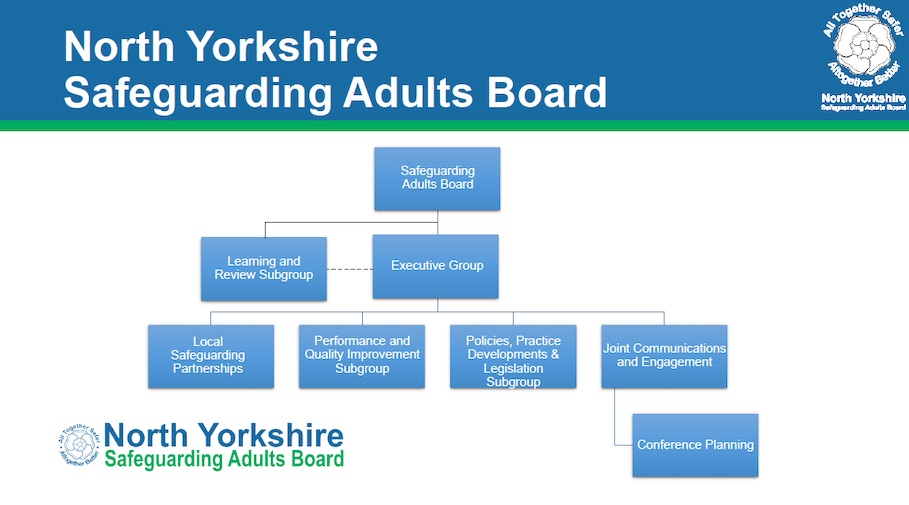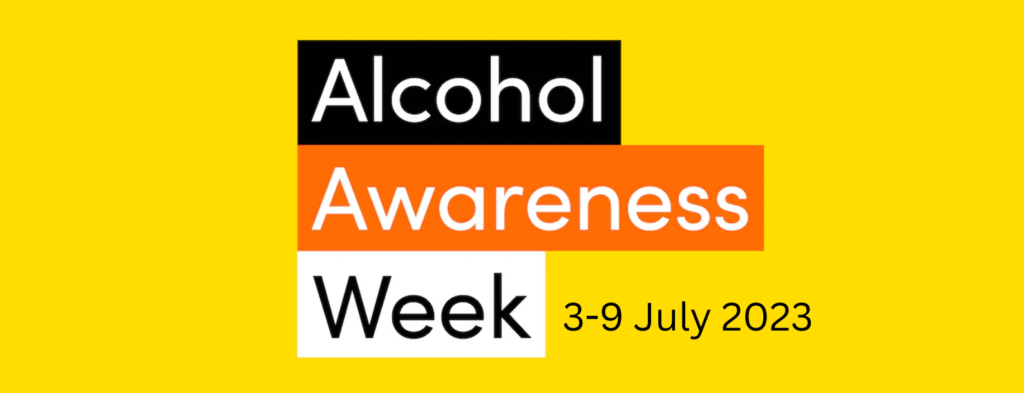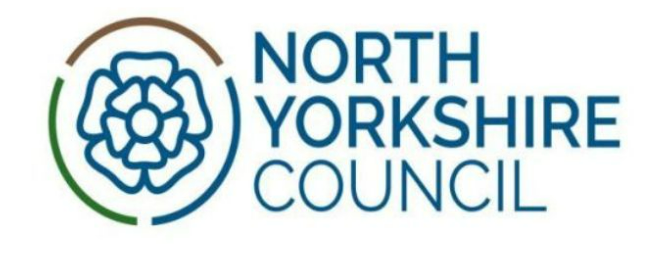Board Structure

Terms of Reference
Purpose
To set the strategic direction for the partnership, ensuring that the priorities, membership, and resources enable its effectiveness.
To be assured of the delivery of the jointly agreed strategic plan through the oversight of a robust governance and committee structure where all partners contribute.
To be the accountable body for the statutory partners and responsible for key decision making.
To contribute to the overall aims by carrying out key tasks:
– Agree and monitor statement of purpose, principles and values
– Gain assurance on progress towards annual aims and objectives,
– Oversee key performance issues
– Consider implications of national and local policy on local strategic plans,
– To monitor outcomes and effectiveness of multi-agency policies and procedures
– Use data and intelligence to identify, monitor and mitigate risk
– Publish an annual strategic plan
– Publish an annual report
– Commission Safeguarding Adults Reviews and provide input as appropriate to Serious Case Reviews and Domestic Homicide Reviews
– Ensure that the promotion of safeguarding adults policies and good practice is adequately resourced across the partnership
– To ensure strong links exist between the Safeguarding Adults Board and a range of other relevant partnerships, including the Safeguarding Children Partnership, Community Safety Partnership, and Local Safeguarding Adults Groups
– To provide leadership for Board sub groups and task groups, and monitor their effectiveness.
Chair
An Independent Chair who possesses the required skills and experience will be appointed by the mandatory statutory partners. The Chair will chair the Board, and the Executive Group.
The Chair will serve a two year term, which may be extended for a further two years on the basis of agreement of the statutory partners, for a maximum of 4 years in total.
A Vice Chair will be appointed from one of the statutory partners on a two year term. Ideally, this term should be 6 months in arrears of the Chair appointment to enable deputisation if there is any period of vacancy at the end of the Chair’s term of office.
Membership
Members from statutory agencies must have senior strategic board level responsibility for their agency and will consist of
– Corporate Director of Health and Adult Services (NYCC)
– Director of Public Health (NYCC)
– Assistant Director Care and Support, NYCC
– Assistant Director Quality and Engagement, NYCC
– North Yorkshire Police (DCC or above)
– Clinical Commissioning Groups – to be represented by Executive Director Nominated by the Chief Executive
o North Yorkshire CCGs
o Airedale Wharfedale Craven CCG
– 1 x Acute Hospital NHS Trust (Director Level)
– 1 x Mental Health NHS Trust (Director Level),
– North Yorkshire and Humber Area Team, NHS England (Senior representative)
– District Council Chief Executive (with reference to Community Safety, Housing and Domestic Violence responsibilities)
– Independent Care Group (Chief Executive)
– Healthwatch – (Chief Executive).
– Community First Yorkshire– CVS (senior representative)
– North Yorkshire Probation Service – (senior representative)
– North Yorkshire Trading Standards – (senior representative)
In attendance
– Legal Advisor to the Board (NYCC)
– North Yorkshire Safeguarding Children Partnership Manager (NYCC)
– Head of Engagement and Governance, NYCC (Company Secretary)
– Care Quality Commission – will be invited to attend annually
– Crown Prosecution Service – represented by the police and will be invited via police for specific issues.
– A Memorandum of Agreement is in place for the Yorkshire Ambulance service to be represented by the CCG representative.
– Executive Member NYCC
Secretariat – Support from HAS Governance Team
Meetings
There will be a minimum of four meetings a year.
Quoracy
– A quorum of the Board shall be at least 4 separate agencies represented and the Chair/Vice Chair. Interim decisions can be made and then validated electronically with all members following the meeting.
– If at any time there is not a quorum present, the meeting shall not proceed.
Funding and other resources
– There will be a funding agreement between the three statutory partners.
– Business management of the Board will be carried out by NYCC through the offices of the Head of Engagement & Governance.
Accountability & decision-making authority
– Member agencies are jointly responsible for the SAB
– Each agency is responsible for monitoring the performance of its own representative
– Each agency is responsible for two-way communication between the Board member and the agency/group.
– Members from statutory agencies (and those who may on occasion deputise for them) must be able to access and influence at the most senior management level within their own agencies.
– Each member is responsible for communication between the Board and their agency/group and for pursuing the aims of the Board within that agency/group
Links
– The Board will ensure links with other groups e.g. Systems Leadership Group, Community Safety Partnership, Health and Wellbeing Board, Safeguarding Children Partnership
– A protocol is in place between the SAB, Children’s Safeguarding Partnership and Health and Wellbeing Board.
Roles and Responsibilities of Board members
– To promote/champion safeguarding work within own organisation/constituents.
– To attend all meetings of the Board and contribute to debate and decision making (If members are unable to attend a senior level deputy will be provided)
– To represent own organisation/constituents and speak for the organisation / constituents with authority.
– To commit own organisation/constituents on agreed policy and practice matters.
– To ensure that the outcomes of Safeguarding Adults Reviews and incidents are acted on and embedded in front line practice
– To hold own organisation and Board partner organisations to account for the quality of safeguarding work.
– To raise safeguarding issues requiring inter-agency discussion with the Independent Chair.
– To contribute in person or nominate appropriate staff to serve on sub groups and task and finish groups as required.
– To ensure the provision of sufficient information to the Board in accordance with the Quality and Performance framework.
– To contribute to the audit process and ensure that any areas of concern are addressed and lessons learned across agencies
– To act as a single point of contact for discussing issues and problem resolution between agencies.
Review
These governance arrangements to be reviewed in terms of effectiveness every two years. Next review to be completed by year end 2020/21
References: Schedule 2 of the Care Act and draft guidance
Click the icon below to download the NYSAB Terms of Reference:
Aims
– To oversee the delivery of the Board’s Delivery Plan
– To review and address performance matters and steer resources to ensure delivery
– To hold partner organisations to account
– To ensure the front-line workforce understand the NYSAB structure and strategy
– To receive reports from sub committees of the NYSAB, and the Local Safeguarding Adults Groups, and act as required
– To escalate matters of concern to the NYSAB
Objectives
– To report to the NYSAB on progress of the Strategic Plan including matters relating to legislation, policy and professional practice.
– To review progress of the NYSAB Strategic Plan at each meeting.
– To ensure that appropriate task and finish groups are in place to support the Strategic Plan, and commission projects from these groups as appropriate.
– To scrutinise and gain assurance about the work and attendance of all sub- groups, any task and finish groups, and LSAGs on a quarterly basis to ensure delivery of the priorities in the strategic plan, and report to the SAB
– To review safeguarding adults performance in North Yorkshire and analysis of quarterly data reports to the NYSAB on agreed KPIs and agree actions if necessary
– To oversee production of an Annual Report on the activity and progress of NYSAB.
– To gain assurance around management action plans arising out of recommendations made in SAR and Lessons Learned reports.
– To ensure implementation of the Board’s Communication and Engagement strategy.
– To monitor the Board’s budget and approve funding requests and plans for expenditure as and when required, and consider additional expenditure in extraordinary circumstances.
– To make urgent decisions on behalf of the SAB in accordance with the Scheme of Delegation
Membership
Independent Chair
HAS – Assistant Director Quality & Engagement
HAS – Assistant Director Care and Support
CCGs – Director
Police – Deputy Chief Constable
Acute Trust – Executive or Deputy Director
TEWV – Executive or Deputy Director
Designated Safeguarding Professionals
Representative from Safeguarding Children Partnership and Community Safety Partnership
Policies, Practice & Legislation Sub-Group Chair
Performance & Quality Improvement Sub-Group Chair Learning & Review Sub-Group Chair
Secretariat – Support from HAS Governance Team
Meetings
The Executive Group will meet one month before full SAB meetings to enable it to review activity in the previous quarter and to enable timely reports to the SAB. Members are expected to attend all meetings. If they are unable to attend they will identify a deputy with decision making authority from their agency.
This group will be chaired by the Independent Chair. The group will be responsible for ensuring that there are effective governance arrangements for managing the Board business.
Accountability and Decision Making Authority
Each agency/organisation is responsible for ensuring two-way communication between the Executive Group and the agency/organisation they represent.
Reporting
The Executive Group will report to the Safeguarding Adults Board.
The sub-groups of the SAB and Local Safeguarding Adults groups will report to the Executive at every meeting by way of written report.
Click the icon below to download a copy of the Executive terms of reference
Aims
– To promote a culture of continuous learning across the Safeguarding Board and its wider partnership
– To share learning so that there are lasting improvements to services which safeguard and promote the welfare of adults at risk of abuse or neglect
– To oversee Safeguarding Adults Review and Lessons Learned processes and outcomes on behalf of North Yorkshire Safeguarding Adults Board consistent with national guidance and the Board’s Safeguarding Adults Review Policy.
– To ensure that recommendations from Safeguarding Adult Reviews, or lessons learned are incorporated into front line practice
– To carry out reviews or audits of practice/lessons learnt that do not meet the requirement for a SAR, with a view to gathering further learning that can be shared amongst partners of the NYSAB.
Objectives
– Develop a SAB Learning and Improvement in Practice Framework to underpin processes for learning and change across the partners.
– Gather shared learning from practice nationwide, including developing action plans as a result of SARs undertaken elsewhere in the country
– Regularly carry out reviews/audits to establish whether there are lessons to be learned from cases about the way in which local agencies work together to safeguard adults in North Yorkshire, including cases that have been well- managed by multi-partnership agencies and where examples of best practice can be shared
– Establish what those lessons are, how they will be acted on, and what is expected to change as a result
– As required on behalf of the Board, set up a Safeguarding Adults Review Panel to carry out Safeguarding Adults Reviews in accordance with Section 44 of the Care Act
– Enable effective communication with all stakeholders to ensure that national and local learning is widely disseminated. Monitor progress of a review/lessons learnt investigation, and report to the Executive as appropriate
– Meet at least annually with the Communications and Engagement Sub group to discuss proposals for topics for learning summits and/or safeguarding conferences or seminars
– Report on outcomes and learning points from Safeguarding Adults Reviews and Lessons Learned Reviews to the Safeguarding Adults Board
– Keep the Safeguarding Adults Review Policy (including criteria for reviews) under review, advising on its effectiveness and best practice.
– To monitor compliance with recommendations of completed SARs and Lessons Learned Reviews for a period of 12 months after publication of an overview report (or as agreed by the SAB), and seek assurance through additional audits that changes to practice have been embedded.
Membership
Chair – tbc
HAS Assistant Director (Integration)
HAS Head of Practice
Nurse Consultant Safeguarding Children and Vulnerable Adults Primary Care
Police representative
Designated Nurse Safeguarding Adults
Healthwatch
Additional Members to be considered on a case by case basis
Secretariat – Support from HAS Governance Team
Meetings
Quarterly
Accountability and Decision Making Authority
The Sub-Group is formally accountable to the SAB, and will provide quarterly updates to the Executive.
The Chair will meet with the NYSAB Independent Chair at least annually
The Sub-Group Chair is responsible for ensuring links and effective communications are made between it and other Board Sub-Groups and partnerships.
North Yorkshire Safeguarding Adults Board Safeguarding Adults Review Sub-Group (Task and Finish) Terms of Reference
Aims
To support the Board to ensure robust, transparent and consistent practice regarding:
– The screening and reviewing of cases against the criteria within the SAB’s Safeguarding Adults Review Policy;
– The type, mechanism and methodology of review undertaken; and
– The progress and outcome of the review.
Objectives
– Consider referrals of new cases against the criteria within the NYSAB Policy for holding a SAR or other type of learning review
– Commission and consider sufficient information on which to make a recommendation to the NYSAB Chair whether a statutory or non-statutory SAR should be commissioned
– Make recommendations to the NYSAB Independent Chair on the appropriate type of case review and where responsibility rests for leadership, oversight and co-ordination of the chosen review process
· Convene a SAR Panel to
o Establish individual terms of reference and set timescales for the SAR in agreement with the Learning and Review Sub-Group
o Ensure the review is conducted according to the agreed terms of reference and methodology
o Ensure appropriate involvement of, and information from, professionals and organisations that were involved with the adult
o Where relevant, nominate and agree individuals to link to the adult and/or family members to ensure they are clear about the purpose of a SAR, and have an advocate if needed
o Identify the resources required to carry out a SAR, including the need to commission independent expertise.
o Notify NYSAB of any administrative/ resourcing arrangements that require attention
o Consider how the interfaces between other reviews/proceedings should be managed in order to maximise learning for individuals and organisations, and to avoid duplication for families and professionals
o Initiate the preparation and implementation of media and communication strategies as necessary,
o Ensure legal advice is sought as required
o Inform the Learning and Review Sub-Group of outcomes of a SAR through a final report including recommendations for action.
Membership
The Sub-group size should be proportionate to the nature and complexity of the review, in addition to a chair with a level of independence from the case under review. As a guide, this should be a Chair and 3 members of NYSAB
Click the icon below to download a copy of the Learning and Review Sub Group (inc. SAR Task and Finish group) terms of reference
Aims
– To establish a performance management framework that enables NYSAB to effectively meet its objectives;
– To review and monitor key performance indicators, ensuring progress and seeking assurance of improvements, or authorising intervention to address concerns
– To ensure that systems are in place to collate, analyse and report qualitative and quantitative intelligence from across partners in order to inform policy, practice and service delivery; and
– To support the purpose of North Yorkshire Safeguarding Adult Board through delivery of key aspects of the Delivery Plan.
Objectives
– To identify key data sources from partner agencies relevant to the monitoring of adult safeguarding services and gaps in data collection;
– To establish a core dataset to be used to monitor and report performance and outcomes;
– To establish a framework and mechanisms for routine collection of data from partners;
– To monitor the presentation of the dataset and its effectiveness;
– To review both qualitative and quantitative data and to discuss and analyse the findings;
– To provide quarterly reports of performance data, including annual trend data to the Executive Group;
– To constructively challenge data anomalies and unexplained trends and commission, where appropriate, additional intelligence;
– To work with other SABs in the region/country around collection and benchmarking of data;
– To oversee effective flows of intelligence between the sub-groups and the Board.
Membership
Chair – tbc
CCG Director of Nursing Public Health Consultant
AD Health and Integration (HAS) Designated Nurse for Adult Safeguarding North Yorkshire Police senior representative
Independent Care group senior representative NHS Trust Deputy Director
Head of Practice (HAS)
Data and Intelligence Team Leader (NYCC)
Secretariat – Support from HAS Governance Team
Meetings
The Performance & Quality Improvement Group will meet four times a year as a minimum, with meetings scheduled to enable timely reports to the Executive Group. Members are expected to attend all meetings. If they are unable to attend they will identify an alternative attendee from their agency.
Accountability and Decision Making Authority
The sub-group is accountable to the Executive Group through the sub-group chair, who attends the Executive Group as a full member. Individual members of sub- groups are responsible for ensuring two-way communication between the sub-group and the agency/organisation they represent.
The sub-group is responsible for ensuring links and effective communications are made between this group and other Board sub-groups including Local Safeguarding Adults Groups, to ensure consistency of standards and messages.
Reporting
The Performance & Quality Improvement Sub-Group will report to the Executive Group on a quarterly basis. The group will also identify messages that can be shared with other partnerships, e.g. Community Safety Partnership.
Click the icon below to download a copy of the Performance and Quality Improvement Group terms of reference
Aims
– To work in partnership with multi-agency partners to lead the development and improvement of safeguarding practice that is focused on improving the outcomes for adults at risk in North Yorkshire.
– To have oversight through regular monitoring of the implementation of multi- agency safeguarding policies and procedures across the NYSAB partners
– To have oversight of the establishment & delivery of a Multi-Agency Safeguarding Team (MAST), ensuring capacity, capability and delivery of its agreed objectives
– To provide assurance through monitoring of training uptake and evaluation across the partnership
– To lead the implementation of the Mental Capacity Act, Liberty Protection Safeguards and other relevant legislation across North Yorkshire, ensuring good practice and a coherent approach across all organisations;
Objectives
– To support the purpose of North Yorkshire Safeguarding Adult Board through delivery of aspects of the Delivery Plan which relate to multi agency procedures and practices and training and practice relating to key areas of legislation.
– To develop and embed arrangements around People in Positions of Trust (PIPOT)
– To ensure that a Board training strategy is agreed and implemented to improve knowledge and skills of practitioners and respond to variation in needs from multi agency partners.
– To ensure partners’ compliance with multi-agency safeguarding procedures by undertaking/commissioning regular audits of activity under the NYSAB Quality and Performance Framework;
– To ensure that the safeguarding training strategy is integrated with Mental Capacity Act and Liberty Protection Safeguards training so that mental capacity issues are embedded within the safeguarding training pathway
– To ensure that multi-agency training is up to date and there are consistent standards in safeguarding training delivery. Monitor the completion of training by individual partners’ staff.
– Identify new and emerging training needs
– To ensure implementation of the agreed multi-agency policy and procedures and embedding within practice, including identification of training.
– To review the operational effectiveness of safeguarding adults policies and procedures, and propose amendments for consideration by the SAB.
– To monitor progress against those elements of the NYSAB Delivery Plan for which it has responsibility, and report to the Executive on a quarterly basis.
Membership
Chair – tbc
HAS Assistant Director (Care and Support)
HAS Head of Practice
HAS Service Manager Mental Capacity (MCA) / Deprivation of Liberty Safeguards (DoLS)
Nurse Consultant Safeguarding Children and Vulnerable Adults Primary Care
Designated Nurse Safeguarding Adults
Police representative
Healthwatch representative
Independent Care Group (ICG) representative
Community First Yorkshire representative
Additional Members to be considered as necessary
Members will be safeguarding leads who manage practice in SAB partner agencies and must be able to influence senior decision makers in their respective organisations
Accountability and Decision Making Authority
The sub-group is accountable to the Executive Group through the sub-group chair, who attends the Executive Group as a full member. Individual members of sub- groups are responsible for ensuring two-way communication between the sub-group and the agency/organisation they represent.
This group will oversee the MAST task and finish group and link with the HAS Safeguarding Project group and ensure that regular reports are shared with the Executive, and concerns escalated as required.
Reporting
The Policies, Practice & Legislation Group will report to the Executive on a quarterly basis. The group will also identify messages that can be shared with other partnerships, e.g. Community Safety Partnership.
Secretariat – Support from HAS Governance Team
Click the icon below to download a copy of the Policies, Practice Development and Legislation Group terms of reference

Board Membership
To view a full list of the NYSAB Board Membership click here





 View all our news
View all our news